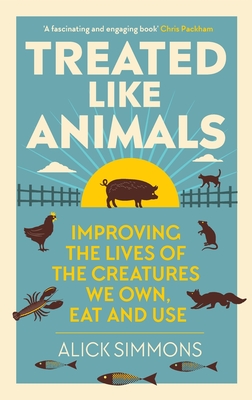Treated Like Animals: Improving the Lives of the Creatures We Own, Eat and Use

Treated Like Animals: Improving the Lives of the Creatures We Own, Eat and Use
You don't have to be an animal rights activist to take an interest in how we treat other creatures. All of us are complicit because all of us, with few exceptions, use animals in some way. How we define 'use' or exploitation should be broad: everything from enjoying a steak or poached eggs, to riding a horse, to keeping a cat as a pet. Animal use is so deeply engrained in our daily lives that we barely notice it. But also we might choose not to look because we are uncomfortable about how some animals are farmed. On the other hand, animal use might not be noticed because, in the case of wildlife 'management', it is unaccountable, taking place behind fences, or is deliberately secret as is the case in animal research. An animal's capacity to suffer is not related to the way it is protected by the law, and most killing of wildlife uses methods known to be inhumane. The vast majority of decisions about animal exploitation take little or no account of public opinion and the science of animal welfare. Meanwhile, most vets spend a lot of their time facilitating society's exploitation of animals: helping them grow well so we can eat them, ensuring they recover from going lame so we can ride them, and stopping disease so they don't poison us. These are the veterinary services we don't like to talk about. Unlike other considerations of animal ethics, this timely and incisive book offers practical insights into the various ways in which animals are exploited, and sets out alternatives based on utility, a recognition of animal sentience and the involvement of wider society in key decision-making. It makes compelling reading for anyone who has an interest in animals, whether wild or domestic, free-living or captive, people intrigued about how their food is produced, and those keen to make informed and intelligent decisions.
PRP: 215.89 Lei
Acesta este Prețul Recomandat de Producător. Prețul de vânzare al produsului este afișat mai jos.
194.30Lei
194.30Lei
215.89 LeiLivrare in 2-4 saptamani
Descrierea produsului
You don't have to be an animal rights activist to take an interest in how we treat other creatures. All of us are complicit because all of us, with few exceptions, use animals in some way. How we define 'use' or exploitation should be broad: everything from enjoying a steak or poached eggs, to riding a horse, to keeping a cat as a pet. Animal use is so deeply engrained in our daily lives that we barely notice it. But also we might choose not to look because we are uncomfortable about how some animals are farmed. On the other hand, animal use might not be noticed because, in the case of wildlife 'management', it is unaccountable, taking place behind fences, or is deliberately secret as is the case in animal research. An animal's capacity to suffer is not related to the way it is protected by the law, and most killing of wildlife uses methods known to be inhumane. The vast majority of decisions about animal exploitation take little or no account of public opinion and the science of animal welfare. Meanwhile, most vets spend a lot of their time facilitating society's exploitation of animals: helping them grow well so we can eat them, ensuring they recover from going lame so we can ride them, and stopping disease so they don't poison us. These are the veterinary services we don't like to talk about. Unlike other considerations of animal ethics, this timely and incisive book offers practical insights into the various ways in which animals are exploited, and sets out alternatives based on utility, a recognition of animal sentience and the involvement of wider society in key decision-making. It makes compelling reading for anyone who has an interest in animals, whether wild or domestic, free-living or captive, people intrigued about how their food is produced, and those keen to make informed and intelligent decisions.
Detaliile produsului










